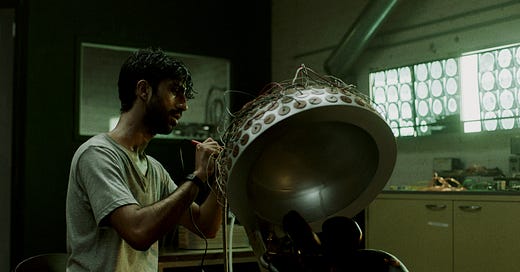Of Those Who is an independent newsletter of film criticism and moviegoing. Please visit the About page for a primer on what this is, support by sharing/subscribing, and feel free to send along any feedback.
Support Your Cinema(s) :)
Few of us have ever had a headache in the manner that lead character Ethan experiences in the film Minor Premise. When they come on, the camera shakes with heavy fervor, the frames fade and split into one another, and he eventually collapses through time, awaking moments later to him, but hours later for everyone else. The sheen of sweat glistens off his face and neck disgustingly, almost as if he’s in a David Cronenberg movie, and in a few more seconds he’ll turn into BrundleFly. Ibuprofen was never meant to relieve this level of pressure.
Minor Premise is no small (or minor) achievement. It’s independent all the way, and resourceful to a fault. The majority of the story takes place in Ethan’s home, where in his basement laboratory, he’s working on the next iteration of a memory capturing machine. It is his goal to identify and isolate certain memories, with the result being a new and improved person/consciousness. Unfortunately, he’s also a helpless and self-loathing drunk who, during a routine bender, tests the device on himself and, subsequently, unleashes ten different fragments of his being in his one body.
M. Night Shyamalan’s Split tackled similar territory with a dangerously fantastical edge and “understanding” towards personality disorder, but what this film does instead, while also fantastical, maintains a more sci-fi feel, never taking a definition of mental illness and manipulating it for horror and thrills. Whether that worked in Split’s case is up for debate, but Minor Premise remains in a state of gritty personal turmoil, bringing Ethan’s multiple emotions - powered strongly by the attached memories he must reckon with - to a heightened and terrifying degree. He’s running against a clock to both bring himself back to a default setting and to complete his work, only he’s the explosive his efforts are working to outpace, and one part of his consciousness wants full control.
As a whole, the story is pretty simple. A protagonist with personal problems must race to solve a bigger problem before it’s too late. Minor Premise takes this “premise” (sorry) and amps it up with efficiently crafted effects that evoke the pain and stakes involved, and the very performance at the center of everything. Sathya Sridharan breathes sadness, spirited anxiety, and self-destructiveness into Ethan’s soul so well, one might feel more for the actor than the character he’s portraying. But not to worry, as Sathya is in absolute command, even when Ethan gets closer and closer to ultimate oblivion. The more he and the role he’s been casted into continue downward into this experiment - “this” being his performance and his performance’s plot - the more the line blurs between real and reel.
The trickery at play in this movie is staggering, and never lets up. Kudos to director Eric Schultz and actor Sathya Sridharan for creating such chaos and madness for an audience to absorb and stress along with. Never does the science jargon go over our heads, as the focus is more on Ethan cracking into pieces and time being against him. Rarely do movies express the look of emotional memory so inventively and so well, and even more rarely use it as a weapon to fight expectations.
This is no Split, and that’s good for both films. Such individuality deserves grand merit.
(Minor Premise is now on VOD)
(Writer’s note: I’m ending doing posts as split issues for the time being, in favor of an article per weekday format. Maybe a zine is down the road?)





